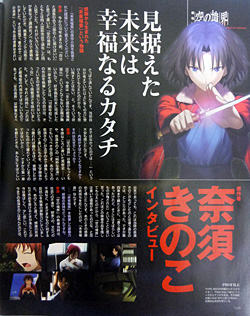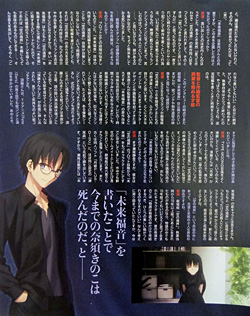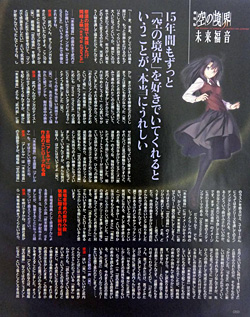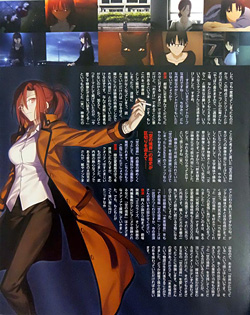
Blessed are those who look towards the future
—Could you please tell us how the original novel Future Gospel came about?
Nasu: It was about 10 years ago when I wrote Kara no Kyoukai, hoping that I could connect with even one other person with this story. It was originally a doujinshi that was handed out during Comiket. A string of good luck led to it becoming a publication in Kodansha Novels, and was published by Shogyo Line. At that point, I felt content having that just be the end of it for Kara no Kyoukai; it had already grown so much larger than I could have ever anticipated that I felt no regret in leaving it there. Yet somehow a plan later dropped to have it be converted to a 7 chapter movie series. With a few setbacks, the first chapter was completed, and when I saw it, I... I almost didn't know what to say... the man I was when I penned this over 10 years ago would have never believed this. Yet at the same time I felt a sense of unease. No matter how wonderful the movie version is, Kara no Kyoukai just wasn't meant to be a movie.
—Even though you felt it to be so great? Why is that?
Nasu: The actual writing of Kara no Kyoukai is a pretty embarrassing memory for me—suffice it to say it is a work that represents my true self at the time. I wrote it at a time when I felt I could take on the world armed only with my words, and I realized [through this movie] that the farther removed it became from the written medium, the more distant it became from what I was actually trying to express. So as successful as it was, it was on a different path than what my past self was trying to take with it, and it just didn't match up. Yet in seeing up through the fourth chapter, I came to realize that although I was on a different path then, it doesn't mean that I didn't leave some pretty good things behind. As the movie versions have allowed me such realizations, I was again reminded of the real value of Kara no Kyoukai. My heartfelt gratitude towards that period of time has been thus manifested into Future Gospel.
—So the driving force behind Future Gospel was that feeling of gratitude of yours.

Nasu: When I wrote Kara no Kyoukai, I felt resistance towards so many things—society, entertainment, culture—and it was my motivation to write the story. Now, I am thrilled to be writing from a place of gratitude, though with just a touch of sadness. It feels like the old Nasu Kinoko has passed on. I suppose you could say I've gone under a heavy detox, and feel much more virtuous now (laughs).
—Though Future Gospel is a collaboration with Mr. Takeuchi, who had the initial plan for the book?
Nasu: The proposal first came from Takashi, actually. At one point he suddenly said "Let's make a new Kara no Kyoukai doujinshi for the Summer Comiket!". I was like, "Where the hell did that come from?" To force myself to bring something back that I felt ended so beautifully would feel like trying to revive a real person. And even if it worked, it would become something like a proverbial Frankenstein. I painstakingly put my heart into this work... yet even as I say that, my unflinching bond to the work gave me some curiosity towards something so rash.
—What kind of work was this, which carried such appreciation to the theatrical release staff?
Nasu: Figuring out the plot was a rather troublesome task. Outside of Future Gospel, had it been nothing more than an additional short story, it would have been something that simply negated what Kara no Kyoukai was, and gone against both my former self and the fans that loved the work. Future Gospel was originally meant to be an episode related to "Precognition", which was removed from Kara no Kyoukai while I was writing it. If I had written it as the final scene for Ryougi Shiki, it could have had some real merit in the original work. When I realized that, I gave myself permission to write it out, and I was able to put it to life on paper. The writing itself came and went in a flash, but the plot does take up a considerable amount of time.
Working with the talents of both the director and animation director
—Though the movie version of Future Gospel has yet to be released as of this interview, what are your thoughts regarding the storyboarding and production processes?
Nasu: This movie has an amount of content on par with the cumulative 6 years of work the ufotable staff put into Kara no Kyoukai. And I feel proper credit must be given to the director Mr. Tomonori Sudou, who has also been the animation director and character designer. The original work for Future Gospel was a more subdued story, one perhaps better suited for a one-hour TV drama, thus I felt it not quite fitting for the type of entertainment required of a movie adaptation. However, Mr. Sudou was truly able to capture the few big moments and make them shine on the big screen. The scene with an explosion, for example, looked brilliant, while the action scenes flowed with such grace and beauty. His storyboarding was very straightforward. He worked very flexibly, and showed me something that I am sure caters to what anime fans will want to see. You can definitely feel him in this work, and is just a pleasure to watch.
—Mr. Sudou was also involved in the storyboarding and production of the fifth chapter of the TV anime Fate/Zero, so I suppose we have already caught a glimpse of his talent then.
Nasu: He also seems to have a keen understanding of TYPE-MOON's art style. Mr. Sudou also played Tsukihime, much to my surprise. Together with the director of the second chapter, Mr. Nonaka Takuya, they pitched the movie adaptation of Kara no Kyoukai to ufotable president Mr. Kondo. He understood just how much fans have been yearning for this, and with a man of his brilliance at the helm for both production and animation, this is not something that should be missed.
—Regarding Future Gospel, what was the inspiration behind the characters?
Nasu: For Seo Shizune, she was already present in the initial plot of Kara no Kyoukai as a character possessing "precognition". She's even referenced as Azaka's roommate in the story, and makes a brief appearance in the 6th chapter of the movie. And she also appears in the old doujin Tsukihime PLUS-DISC as Akira Seo, who is pretty much the same character. With that in mind, I can't quite call Shizune a "new" character within Future Gospel. I had originally planned for her to be a part of Kara no Kyoukai, and feel her to be more of a character we pulled off the shelf. Kamekura Mitsuru and Ryougi Mana, however, were the two completely new additions to the movie.
—Mitsuru and Mana were standouts in Kara no Kyoukai, weren't they?
Nasu: In the movie adaptation, yes. As it was a movie that was created over 10 years after I had written the story, I felt it fitting to introduce characters that span that length of time as well. The old Nasu Kinoko would have stubbornly insisted that once a story's done it's done. Like if you were to create a most beautiful box, to just leave it as it is. Now I feel I've matured to a point that even such a beautifully crafted box can be opened, ever so slightly, and expand upon the world. And just as I have changed over the last 10 years, I wanted to create a character like Mitsuru to portray how a person can change over time.
It happened through Nasu's Persuasion?! The simultaneous screening of Extra Chorus

—The 3 manga volumes that Mr. Takeuchi drew within the original Future Gospel, entitled Extra Chorus, will also see a movie adaptation, correct?
Nasu: I can't think of when that man didn't want to be drawing manga. Over the last 10 years he's either done sketch work or been the company president (laughs). Seeing the movie version of Kara no Kyoukai had a different impact on him than it did me; he swelled with a feeling of gratitude and wanted to express it through manga. Yet he never thought in his wildest dreams that it too would have its own movie (laughs). Mr. Kondo, the company president, and Aoki Ei, the director, conspired to move the project forward, and Takashi bashfully said "No way guys, you can't!" The poor guy was so against it. But I came in from behind for the kill, and said "But you had me write Future Gospel to live up to the fans' expectations, didn't you? So isn't it your turn to do the same for them?" That did the trick (laughs).
—I don't even know what to say to that level of persuasion (laughs). So what were your feelings on the storyboarding from director Aoki, and on the production as it progressed?
Nasu: It really matched the style of Takashi's manga. Mr. Sudou seemed to have redone the art from scratch, and I was shocked to see that [Aoki Ei's] designs looked more like Takashi's artwork than even Future Gospel. This is just my opinion from a glance, but it seemed to have the familiar air of director Aoki's work on the TV anime Wandering Son. While this short story connects the three volumes together, a lot of minute details were incorporated to have it function as a standalone film, giving it this great overall chic feeling; it honestly feels like a special addition to Kara no Kyoukai. And while it's been integrated into Future Gospel, there will be no other such extravagant installment to the series (laughs).
The renowned theme song "Alleluia" from the epilogue
—The theme song to Future Gospel, "Alleluia", was quite special wouldn't you say?
Nasu: While "Alleluia" is the theme song to Future Gospel, it's not something that was simply tacked on at the end of Kara no Kyoukai. Truly, fans may see it more as a song that encapsulates the entire series. When considering a song of such magnitude, I used my own intuition and tried various things. If it seemed to match my vision of Kara no Kyoukai, then would that not be more like "Oblivious", the ending theme of the first chapter? It wouldn't match the more tranquil Future Gospel. Yet if I went more towards a ballad to more closely match that, it would remove itself entirely from Kara no Kyoukai. For a while I was really at a loss on this one. But Ms. Kajiura Yuki, the songwriter, brought the best of both worlds with this song. It's a ballad, but still somewhat up tempo, and what you get is something that is just so soothing to listen to. It's such a gentle tune. And when it's over, you're left with this serene, yet invigorating feeling that leaves you feeling like you could do anything. It so perfectly fits the idea of a "Gospel". For those who have stayed with the entire Kara no Kyoukai series, is it not enchanting? I think it is sure to become an iconic song that perfectly fits the epilogue.
Behind the scenes of the new novel as a gift to attendees
—Your as yet unreleased novel Garden of Oblivion was distributed as a gift to attendees. How did you come about writing it?
Nasu: It was the beginning of the year. President Kondo told me flatly, "I want something special made for attendees, so why don't you write a book in the next 6 months or so, ok?" And that's about the tall and short of it. A worldview Like Fate would have been great to be continuously expanded upon, though like I mentioned a moment ago with Kara no Kyoukai, it felt like a beautiful box that had already been completed. Had I started just adding things here and there, as an independent piece it would just be a mess. Future Gospel was a discarded piece that was later dug up and just barely worked out, so to come up with yet another story as an added bonus felt utterly superfluous. So at first, I deeply apologized and said I wouldn't be able to do it. Mr. Kondo understood, and assured me that he just wanted to see if it were possible. I was relieved at hearing this, and when I went back to the company to report this to Takashi, he said "Oh, I get it. That's totally fair. But it really doesn't matter how you feel. There are definitely readers who would want to read another Kara no Kyoukai novel. For instance, the person you see right before your eyes..." He said it with this crazy Schwarzenegger face, so I just...
—So that was pretty much it then (laughs).

Nasu: Pretty much, yea (laughs). As frustrating as it was I felt some truth in Takashi's words. I know that writers cannot simply act according to how they think something should be, so how could I consider myself one if I refuse without properly addressing those who actually want to read more? With this thought in mind, I started mapping out ideas for a new novel. After that, I figured if it was going to be like this, it could be more of an homage to Kara no Kyoukai movie. Regardless, it was something that I had refused before, so at that point the scheduling went pretty horribly. PR from Aniplex gave me an impossible request to come up with something and get back to them in two weeks, and I wound up giving a lot of different staff members trouble. I'm sorry everyone.
—What a hard schedule that must have been to juggle...But if I may digress, can you give us a hint as to what the story will be about?
Nasu: It's an extra for those who ventured out to see the movie, but even so it is a meaningful entry. Yet the second it were to start being sold off as a commercialized book, it would lose its meaning entirely. Once you read it you would immediately understand its place only as an addition to the movie. It's the same with why my name isn't on the front cover. It was also made with the idea that its story would be absolutely impossible to have a movie made out of it (laughs). As happy as I am that Kara no Kyoukai became a movie, despite having no such inkling while I was writing it, it belied just a bit of frustration as well. As a writer, I just have a feeling of not wanting my words to lose to film. This is why I wrote Garden of Oblivion in a way that couldn't possibly receive a movie adaptation, though it's more of a "If you think you can do it this time, give it your best shot!" sort of feeling (laughs).
—I also don't think it would be that hard for the ufotable staff who made a movie out of Kara no Kyoukai when you said that couldn't be done either... (laughs).
Reaching the finale of Kara no Kyoukai movie series...
—Finishing up with Kara no Kyoukai, an artbook will be released from Seikaisha. Have you had a chance to look at it?
Nasu: I was able to take a look at the collector's edition of the book, and it was of exceptional quality. It's a book that Mr. Ota Katsushi of Seikaisha, who is a diehard fan of Takeuchi Takashi's, was absolutely uncompromising with regards to paper and ink quality. It's worlds apart from a digital book. It is not a book that was made for profit, and will not let down the fans who have continued to love Kara no Kyoukai over the last 15 years. It really is the ultimate doujinshi. While the collector's edition will cost about 28,000 yen, the content absolutely fits the price. It is a treasure that will be the cornerstone in the collection of any and all who choose to buy it.
—Finally, with Future Gospel marking the end of the movie series of Kara no Kyoukai, do you have any final thoughts, standing where you are now?
Nasu: Having started as a doujinshi and becoming adapted into a movie, a serialized manga, and a TV anime adaptation based off the movie, among other things, Kara no Kyoukai has developed so much through its involvement in various media. It started as such a niche piece in such a small place, and I never sensed it would expand so greatly. And I can't begin to describe how grateful I am to the people who helped Kara no Kyoukai survive these last 15 years, when so many other pieces have come and gone. I am just so happy. Though the story changed little by little as it drifted through each medium, I feel immense gratitude that each iteration was met with such love. Future Gospel was completed purely due to the love of the fans. I sincerely hope that everyone will feel our gratitude for them as they watch it in theaters.




